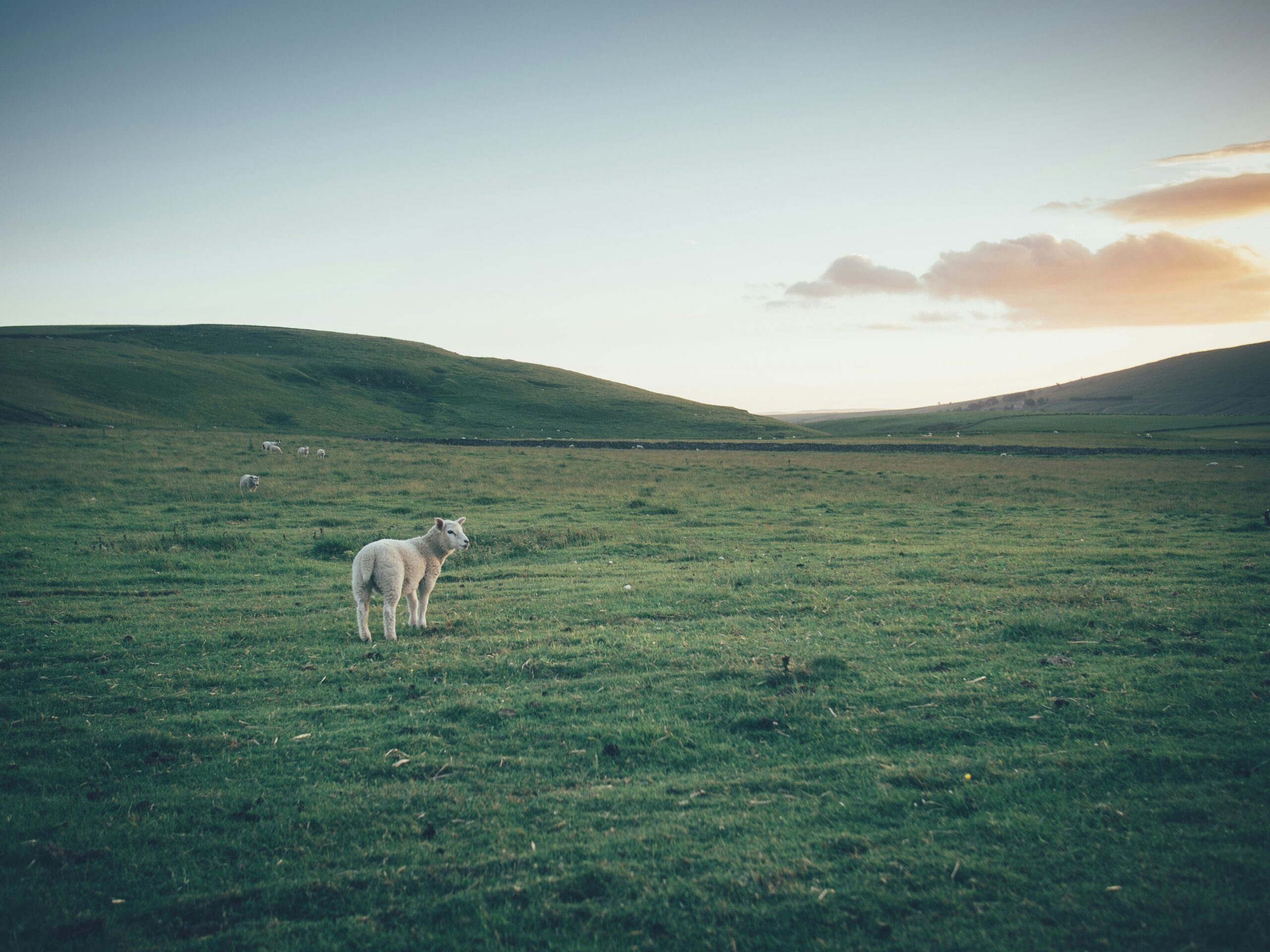Photo by Greg Willson on Unsplash
A Sermon on Luke 15:1-10
by Rev. Chris Bohnhoff
It’s easy to get lost in scripture; to read the text like a novel, where part of the experience is to allow the author to build a world that you escape into, to suspend your disbelief and questioning mind, to just inhabit another world for a little while. But scripture isn’t a novel. It’s part history, part manifesto, part poetry, part myth. If we suspend our disbelief and disengage our curiosity too much, we risk missing out on the wrestling and tension that leads to a fruitful experience. But if we stay present and curious as we read, we find endless questions, like loose threads to pull and test.
Like this passage from the Gospel of Luke. It begins, “Now all the tax collectors and sinners were coming near to listen to him.” I wonder, how would one look at a crowd and know that it’s full of tax collectors and sinners? It goes on, “And the Pharisees and the scribes were grumbling and saying, ‘This fellow welcomes sinners and eats with them.’” Remember, this text was most likely written more than three decades after Jesus’ death, so the odds of this passage accurately describing a specific, factual event are slim. If this is the case, what is the author getting at by setting this scene in these terms?
This passage’s opening gathers a cast of characters: one group of “unrighteous” outsiders, and another group of fasters and regular temple goers, deeply convicted in their standards for who may claim church insider status. Jesus tells the whole cast two stories, and in each, a thing is lost, that thing is found after a lot of effort, and then there’s a party. Luke’s interpretation of both stories, through the words of Jesus, is that people go astray, but God never rests until they’re found, and when they are, the angels rejoice. Feels pretty good, right? It’s the bedrock of our faith, after all, this idea that God knows and loves us always. But Jesus never used parables solely to comfort; he wanted to teach us, dislodge us, make us a bit uncomfortable, and in the process, open us to our blind spots in how we hold and live out our faith. Where’s the discomfort in this parable?
Friends, will you pray with me? Loving God, our creator and companion, we thank you for knowing and loving each member of the web of creation. Help us to follow your example. Help us to go in search of those who we lose or give up on, even when it puts our own lives and plans in jeopardy, even when we don’t agree with or even like those we have lost. In our small ways, help us to find and be found, and in the finding to move this world a little closer to the way it is in your commonwealth. Amen.
For people of a progressive worldview, but really, for all people who believe in cultivating the common good, it has been a dispiriting season in our shared public life. We know what this year has brought: the dismantlings, the unilateral actions, the feel of retribution against the very act of caring about another being. Layered on top is the epidemic of public and political violence that has gripped the Twin Cities and the country. Both the specter of lives that will be lost because of policy, and the actual lives already lost at the hands of radicalized, nihilistic individuals with access to weapons of war hang over us. Some days it feels like in our world, our reality is the opposite of the parable: out of a hundred, it’s the one who is found and the 99 who are lost.
A curiosity that comes up for me in reading this Luke passage, and from reading commentary, is the certainty in Jesus’ voice when he asks, “Which one of you, having a hundred sheep and losing one of them, does not leave the ninety-nine in the wilderness and go after the one that is lost until he finds it?” Like he’s saying, duh, of course, that’s what everyone would do. But is that true? In both stories, we’re talking about individuals of some means; folks in 1st century Israel who had 100 sheep or ten silver coins were doing alright for themselves. Maybe like many of us here. The hypothetical question that, in effect, Jesus is asking this mixed group of folks is, what are you willing to lose, or maybe from the standpoint of the tax collectors and sinners, how willing are you to be lost, disconnected from the flock? Speaking for God, Jesus says the answer is not at all, no one will remain lost, because God seeks unceasingly. But what about you, Jesus asks?
The dominant systems of our society, of capitalism, neoliberal democracy, patriarchy, and white supremacy would answer, oh, there are all kinds of lives that can be lost. In fact, it’s part of all those systems’ design that some workers’ wages must be low for profits to be high. Materials must be procured for the lowest possible price. Areas of scarcity must be maintained so that power can be horded in other small but deep pockets.
The earthly powers, as they are called in scripture, are doing today exactly as they have done since Jesus’ time and beyond. And clearly, a vast chasm exists between the values held by empire, our society included, and God’s values as described in these parables. And we, as citizens of this society, as beneficiaries of its relatively high standard of living, are complicit. We all, consciously or not, just by living in the US, let some sheep wander off into the wilderness, whether those sheep are immigrants, or urban or rural sheep, or sheep whose talents aren’t valued as highly as other sheep, or sheep that happen to live in Gaza, or disabled sheep, or elephant-sheep or donkey-sheep.
That’s not to say we’re happy about this arrangement; many of us feel deep and lingering guilt over the seeming powerlessness of our place in a seemingly safe flock while so many sheep wander in the wilderness. I think it’s one of the reasons that so many in our American flock feel so alone and hopeless – and lost.
Last Thursday was our Minnetonka Lighthouse town hall event, cohosted by Isaiah. The evening’s primary objective was to make the case to Minnetonka’s state legislators that they should do whatever needs to be done to protect Medicaid and SNAP funding despite the federal cuts enacted over the summer. Four people from our community told their stories, describing how slashing these budgets is really slashing communities: a woman with a son and brother who suffer from schizophrenic episodes, who counted on the existence of rural hospital beds for their treatment and medical assistance to pay $47,000 bills; a couple whose son who lives with Down Syndrome, who relies on both SNAP and Medicaid for everything from job supports, to housing, to food assistance, who worry that he may end up homeless; a ResourceWest case manager who works with individuals and families every day who could slide into homelessness themselves without medical and food benefits; and the mayor of Minnetonka, a man of means and power, who fears for the future of his twin daughters, both of whom were born radically premature with significant ongoing physical challenges.
Minutes before the event, the organizers gathered to remind each other why we were there, and the reason we named was this: to create a space where we all could feel less alone. So much rhetoric these days, so many policy directions are designed to make us feel isolated and fearful of each other. Many people understand this strategy and desperately want an outlet, a place to go to do something about it.
Or, in the language of the parable, over 100 people in Minnetonka gathered Thursday night because it’s about time to start gathering up the lost sheep of our society. And we need to stop our government from taking more actions that we know will shove more sheep out into the cold.
There is a time and a place to dive into the nuances of this parable, to debate which character is God and which is us, to ask questions about sin and repentance and historical context. But maybe in this moment of political violence – the kinds perpetrated with semi-automatic weapons and the kinds perpetrated with pens – all we need to know is that there is no acceptable loss in the eyes of God.
If last Thursday is any indication, if the scores of buckets full of flowers in front of Anunciation Church is any indication, if this church’s support for kids going back to school is any indication, there is a growing appetite in our small and large communities for making our flock whole. Because, it turns out, although we’re not sheep, we are beings meant to flock together. And we know that, even if we aren’t immediately threatened from the middle of the flock as the marginalized are picked off, we are not safe from the guilt, and sadness, and spiritual pain of their loss.
This work will not be easy, it will not be quick, it will not be without its defeats, but it is begun, because God is always here searching, coaxing, inviting us into holy search and rescue, celebrating every small victory with us. We are all – neighbors, enemies, angels, God – in this together, because it’s not as easy as lost or found. We, all of us, are lost and found. May we seek. May we apply our hands, feet, and voices to the wellbeing of our flock. And may we be found by God’s compassionate, wise, ever-welcoming face. May it be so. Amen.


Leave a Reply